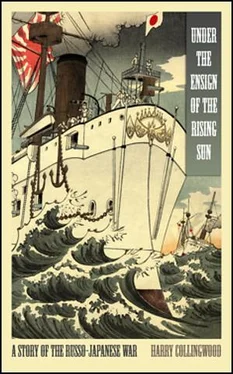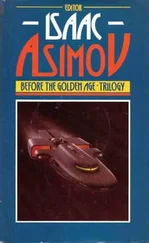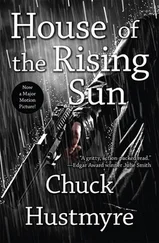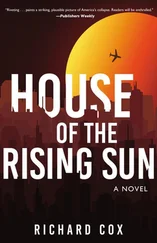Harry Collingwood - Under the Ensign of the Rising Sun
Здесь есть возможность читать онлайн «Harry Collingwood - Under the Ensign of the Rising Sun» весь текст электронной книги совершенно бесплатно (целиком полную версию без сокращений). В некоторых случаях можно слушать аудио, скачать через торрент в формате fb2 и присутствует краткое содержание. Год выпуска: 1916, Жанр: nonf_military, на английском языке. Описание произведения, (предисловие) а так же отзывы посетителей доступны на портале библиотеки ЛибКат.
- Название:Under the Ensign of the Rising Sun
- Автор:
- Жанр:
- Год:1916
- ISBN:нет данных
- Рейтинг книги:4 / 5. Голосов: 1
-
Избранное:Добавить в избранное
- Отзывы:
-
Ваша оценка:
- 80
- 1
- 2
- 3
- 4
- 5
Under the Ensign of the Rising Sun: краткое содержание, описание и аннотация
Предлагаем к чтению аннотацию, описание, краткое содержание или предисловие (зависит от того, что написал сам автор книги «Under the Ensign of the Rising Sun»). Если вы не нашли необходимую информацию о книге — напишите в комментариях, мы постараемся отыскать её.
Under the Ensign of the Rising Sun — читать онлайн бесплатно полную книгу (весь текст) целиком
Ниже представлен текст книги, разбитый по страницам. Система сохранения места последней прочитанной страницы, позволяет с удобством читать онлайн бесплатно книгу «Under the Ensign of the Rising Sun», без необходимости каждый раз заново искать на чём Вы остановились. Поставьте закладку, и сможете в любой момент перейти на страницу, на которой закончили чтение.
Интервал:
Закладка:
At length the superiority of the Japanese fire began to make itself apparent. The speed of the Russian ships steadily fell, and it could be seen that many of them, particularly the battleships, were in great distress. Especially was this the case with Vitgeft’s flagship, the Tsarevich , upon which much of the fire of our own battleships had been concentrated. She had a great hole in her bows, about ten feet in diameter; her anchors were shot away; and her hawse-pipes had vanished—to enumerate only her more apparent injuries. Then a 12-inch shell struck her fore-turret, wrecked its interior and, as we subsequently learned, glanced off, entered the conning tower, killed everybody in it except two, destroyed the compass, and killed the man at the wheel, who, as he fell, jammed the helm hard a-starboard, causing the ship to swerve sharply out of the line and wheel round in a wide circle, completely upsetting the formation and seriously imperilling many of her sister ships. A few seconds later another shell fell aboard her, hitting the foot of her foremast and causing it to totter, though it did not actually fall. This same shell, we afterward learned, literally blew Admiral Vitgeft to atoms, also seriously wounding several of his staff, and throwing the ship into a perfect chaos of confusion.
This was the beginning of the end; shells now literally rained upon her, doing frightful damage both on deck and below, while it was patent to all that she was completely out of control. Her erratic movements produced the utmost confusion in the Russian battle-line, which broke up and became a mere disorganised mob of ships, upon which the Japanese ships at once closed, determined to avail themselves to the utmost of the opportunity to bring the engagement to a speedy end.
And, indeed, the end appeared to be near; for serious as was the plight of the Tsarevich , that of some of her sister battleships was even worse. The Peresviet , for example—the flagship of Prince Ukhtomsky, who, in consequence of the death of Admiral Vitgeft, was now in supreme command—was a perfect wreck, so far as her upper works were concerned; both masts were destroyed, her funnels were battered and pierced, and she was on fire; while the Poltava had two of her 6-inch guns smashed and the containing turret jammed.
At the moment when the confusion created by the erratic movements of the Tsarevich was at its height, the Peresviet displayed a signal from her bridge and, sheering out of the mêlée, headed away back in the direction of Port Arthur, followed by the Sevastopol and Poltava , while the Askold , Admiral Reitsenstein’s flagship, followed by the cruisers Diana, Pallada , and Novik , broke away from the rest of the fleet and, under every ounce of steam that they could raise, headed away in a south-easterly direction, followed by the Asama and six other cruisers. As for the Pobieda and Retvisan , apparently animated by the same desperate resolve, they suddenly shifted their helms and steamed straight for our battle-line, as the mortally wounded lion will sometimes turn upon the hunter and, with the last remains of his fast-ebbing strength, slay his foe before perishing himself. It looked as though both meant to use the ram, the successful employment of which might cost us the loss of at least two of our treasured battleships; and they were accordingly received with a terrific fire from every Japanese ship present. The Retvisan , being slightly in advance of her companion, received the heaviest of our fire, and under it she seemed to crumple up into an almost shapeless mass of wreckage. It was not possible for mere mortals to continue to face such a devastating hail of shells, and as suddenly as she had started toward us she now swerved away, instantly followed by the Pobieda , both steaming hard in the wake of Prince Ukhtomsky’s division, which they rejoined just as the dusk of evening was turning to darkness.
With the flight of those two ships the battle came to an end; because for some reason, known only to himself, Togo failed to follow up his advantage and complete the destruction of the Russian fleet. Some of us were of opinion that he felt himself handicapped by the stringent orders which he had received not to risk the loss of any of our precious battleships, one or more of which might easily have been destroyed in the darkness by mines dropped by the flying enemy, or by torpedoes launched from the decks of daring and enterprising destroyers. And if he was influenced by such considerations as these who shall blame him, or say that he was wrong?
Yet people were not wanting who complained that the battle was an indecisive one, because no Russian ships had been either captured or sunk in the course of the fight. But although this assertion was undeniable, the grumblers forgot a little group of very important facts, the chief of which was that the five Russian battleships and the protected cruiser Pallada which succeeded in regaining Port Arthur harbour were so desperately damaged that they were practically reduced to the condition of scrap iron, inasmuch as that, despite all the efforts of the Russians to repair them, none of them was again able to leave Port Arthur until they fell into the hands of the Japanese when the fortress surrendered. As for the sixth Russian battleship, the Tsarevich , she took advantage of the darkness to separate from the rest of the fleet, and made for Kiaochau, where she arrived on the following day, and where she was of course interned. The same fate befell the cruisers Askold and Diana , the former of which sought shelter at Shanghai, while the latter succeeded in escaping as far south as Saigon. The destroyer Reshitelny , which separated from the Russian fleet immediately after its departure from Port Arthur, escaped the Japanese destroyers and duly reached Chifu, whither she had been sent with dispatches from Admiral Vitgeft, requesting that the Vladivostock squadron might be dispatched to assist him in his proposed passage through the Korean Strait. Her mission accomplished, her commander agreed to assent to the demand of Sah, the Chinese admiral on the station, that she should disarm and surrender certain vital parts of her machinery. The Japanese, however, had their doubts as to the power of the Chinese authorities to enforce this demand, and accordingly Commander Fujimoto took matters into his own hands and, late on the night of 11th October, entered Chifu harbour and, after an altercation with the commander of the Russian vessel, calmly took the Reshitelny in tow and carried her off. This was of course a violation of neutral territory, and led to a little temporary friction, but it ended in the destroyer being added to the Japanese navy.
Chapter Nineteen.
THE FALL OF PORT ARTHUR.
I have said nothing as to the part played by the Yakumo in the battle of the Yellow Sea, for the simple reason that there is nothing particular to relate; but that we played a not altogether unimportant part in the fight is evidenced by the fact that only two of the Japanese ships, namely, the Mikasa and the Nisshin , had a heavier list of killed than ourselves, although the Kasuga scored one more in wounded than we did.
The fact is that, in a general engagement such as that referred to, after the initial movements of the various ships have been noted, one becomes so utterly engrossed in one’s own particular share of the work that there is little opportunity to note more than the most salient incidents of the battle. Moreover, the din of battle, the continuous roar of the guns, the crash of bursting shells, the deafening clang of projectiles upon armour, the screams of the wounded, the suffocating fumes of powder, all tend to benumb one’s powers of observation, so that the captain of a fighting ship has little opportunity to note anything more than the movements of the particular ship which he happens to be engaging at the moment.
Читать дальшеИнтервал:
Закладка:
Похожие книги на «Under the Ensign of the Rising Sun»
Представляем Вашему вниманию похожие книги на «Under the Ensign of the Rising Sun» списком для выбора. Мы отобрали схожую по названию и смыслу литературу в надежде предоставить читателям больше вариантов отыскать новые, интересные, ещё непрочитанные произведения.
Обсуждение, отзывы о книге «Under the Ensign of the Rising Sun» и просто собственные мнения читателей. Оставьте ваши комментарии, напишите, что Вы думаете о произведении, его смысле или главных героях. Укажите что конкретно понравилось, а что нет, и почему Вы так считаете.












